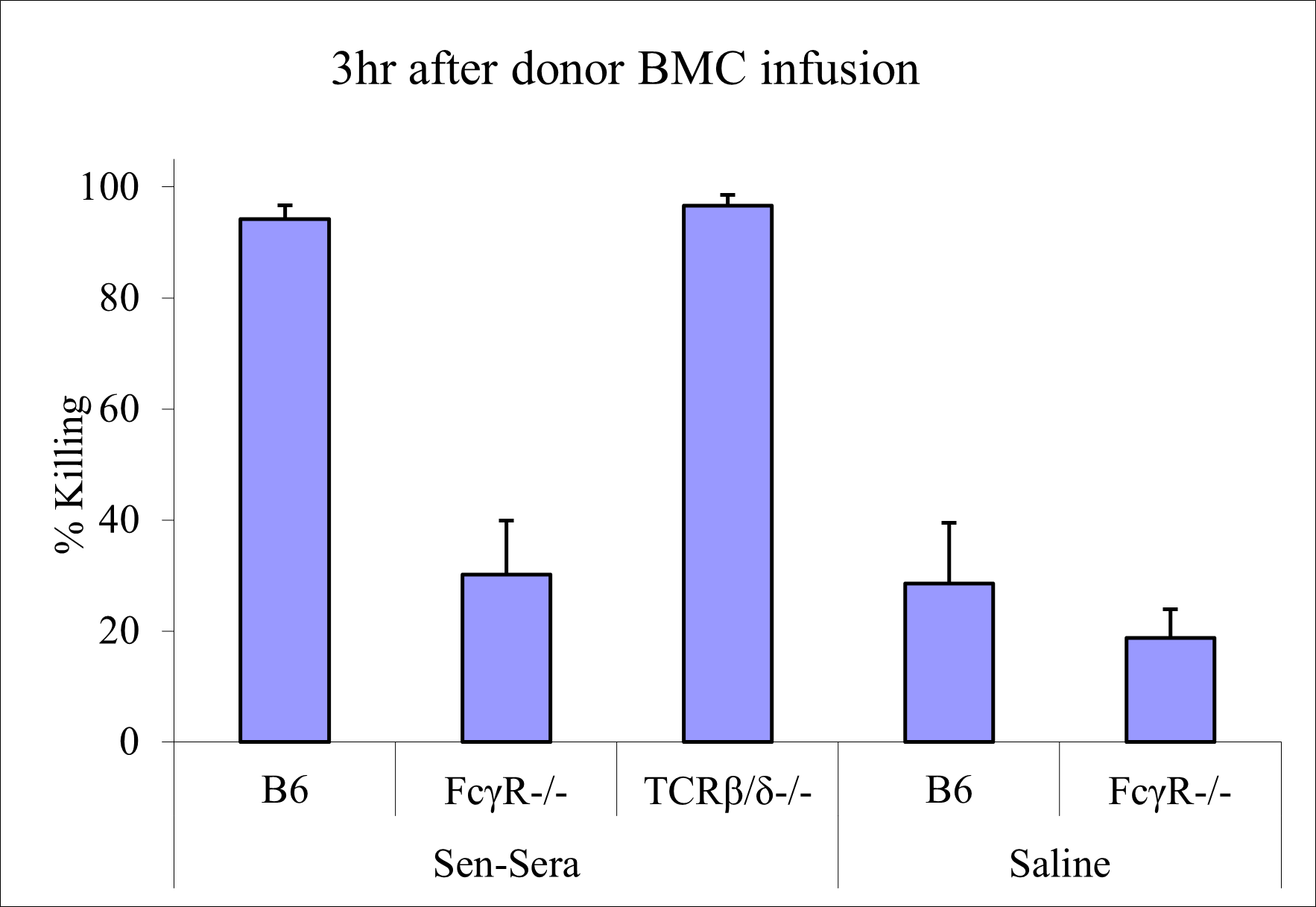Fcγ Receptor-Positive Cells Play a Critical Role in Rejection of Allogeneic Bone Marrow Cells Mediated by Anti-Donor Antibodies
1Talaris, Louisville, KY, 2Talaris Therapeutics, Louisville, KY
Meeting: 2022 American Transplant Congress
Abstract number: 1219
Keywords: Alloantibodies, Bone marrow transplantation, Sensitization
Topic: Basic Science » Basic Science » 04 - B-cell / Antibody /Autoimmunity
Session Information
Session Name: B-cell / Antibody /Autoimmunity
Session Type: Poster Abstract
Date: Monday, June 6, 2022
Session Time: 7:00pm-8:00pm
 Presentation Time: 7:00pm-8:00pm
Presentation Time: 7:00pm-8:00pm
Location: Hynes Halls C & D
*Purpose: Sensitization through prior exposure to MHC antigens results in an increased rate of graft rejection. We previously reported that humoral immunity is the primary barrier for engraftment of allogeneic bone marrow cells (BMC) in sensitized mice. Passive transfer of as little as 25 µL sensitized serum to naive recipients resulted in BMC graft failure. In the present study, we explored the role of T cells and Fcγ receptor-expressing innate immune cells in allogeneic BMC rejection in sensitized recipients using TCRβ/δ double-knockout (TCRβ/δ-/-) and Fcγ receptor-deficient (FcγR-/-) mice.
*Methods: Sera collected between 4-6 weeks after skin grafting were pooled from B6 mice sensitized by BALB/c skin grafts, and 300 µL was injected intravenously into naive TCRβ/δ-/-, FcγR-/-, and B6 mice. FcγR-/-. B6 mice that received saline served as controls. In vivo cytotoxicity assays were performed 1 day after adoptive transfer of sensitized sera (sen-sera). CFSE-labeled naive donor BALB/c splenocytes (20×106, high-intensity as target cells) and naive recipient B6 splenocytes (20×106, low intensity for internal controls) were infused into each experimental mouse. Peripheral blood was collected 3 hours after cell infusion. Peripheral blood lymphocytes were analyzed for CFSE expression by flow cytometry. The percentage of killing was determined by calculating the ratio between target and internal control cells.
*Results: B6 control mice eliminated 28.5±11.0% of donor cells and B6 mice with sen-sera rapidly killed 94.2±2.5% donor cells (Figure). The percentage of cytotoxicity for TCRβ/δ-/- with sen-sera was 96.6±2.0%, similar to the percentage in B6 mice with sen-sera (P=0.14). However, FcγR-/- with sen-sera only eliminated 30.2±9.7% of donor cells, which was similar to B6 controls (P=0.82). The difference in cytotoxicity for FcγR-/- with sen-sera and TCRβ/δ-/- with sen-sera was highly significant (P=0.00006).
*Conclusions: Our study demonstrated that FcγR+ cells, but not T cells, play a critical role in rejection of allogeneic BMC mediated by anti-donor antibodies. Fc receptors are found on innate immune cells such as macrophages, neutrophils, and NK cells. These data suggest that the immediate rejection of BMC in allosensitized recipients is mediated by donor-specific antibody-mediated phagocytosis by phagocytes and antibody-dependent cell-mediated cytotoxicity by NK cells. This study could have clinical significance for the management of BMC transplant patients to overcome the sensitization barrier.
To cite this abstract in AMA style:
Xu H, Huang Y, Xu H. Fcγ Receptor-Positive Cells Play a Critical Role in Rejection of Allogeneic Bone Marrow Cells Mediated by Anti-Donor Antibodies [abstract]. Am J Transplant. 2022; 22 (suppl 3). https://atcmeetingabstracts.com/abstract/fc%ce%b3-receptor-positive-cells-play-a-critical-role-in-rejection-of-allogeneic-bone-marrow-cells-mediated-by-anti-donor-antibodies/. Accessed February 28, 2026.« Back to 2022 American Transplant Congress

